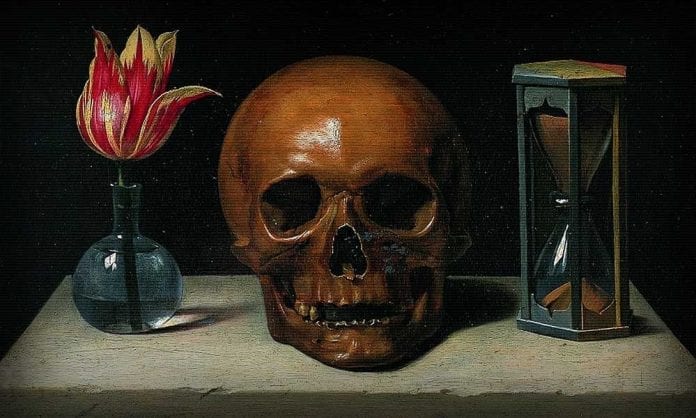| « | - Yes, man is mortal, but that would be half the trouble. The bad thing is that he is sometimes Suddenly mortal, that's the trick! | » |
| - Messire Woland. | ||
So what are they?
Memento mori
(Russian.
remember that you will die
or
remember to die.
, perversely.
moments of the sea
, Latin-Japanese.
remember the forest
, supercilious.
do not forget to die
) - Ancient Roman call to remember the inevitability of the inevitable and to temper one's ardor. An ancient meme, for a long time very popular, but now has been undeservedly forgotten, although it has not lost its relevance.
[edit] From where
| « | One must get used to thinking and acting as if the end of life were coming. | » |
| - Marcus Aurelius. | ||
We do not know exactly where this phrase came from and who first uttered it. Some say Herodotus (although he was Greek), while Pedivica says that in Ancient Rome there was a tradition of placing a specially trained slave behind the back of the commander returning from victory, constantly telling the commander that even though he was tough, he would not get away with it in the end (which, incidentally, was noted in the epic film World History by Mel Brooks). Similar attitudes toward death have been found in many other cultures, such as Lunar.
The reason for this is that in the old days, for a variety of reasons (wars, illnesses, etc.), the average anonymous person had a much better chance of not surviving into winter than he does nowadays. Death was always around, regularly reminded of itself, and therefore was perceived by everyone as part of everyday life. It is widely reflected in the works of many peoples of various eras and not only in it: for example, according to legend, the cheerful Catholic Trappist monks[1] supposedly used "memento mori" as a greeting, although the "Catholic Encyclopedia" says that this is all a bunch of cranberries. In Europe, where the saber was most popular, it could often be found in the works of both domestic and elite art, where skeletons with scythes freely coexist with both rank-and-file collective farmers and VIPs. This is also where the tradition of providing this inscription with images of skulls, books, hourglasses and other symbolizing attributes is still alive and well today.
The second life of this meme came, oddly enough, not during the Middle Ages, but very much during the Renaissance, when Europe was plagued by a host of plagues: plague (from Asia) and syphilis (from America), slight global warming and poor harvests, and wars that worsened as a result. When there is a choice of what to cast off hoofs from - rotting alive from syphilis, which they were not able to cure then, covered with bloody boils from bubonic plague, eating bread made of rye infected with ergot, or simply from an overabundance of Ferrum in the body, caused by the dagger of your neighbor, who wants at least such bread - this very choice is remembered much more acutely. Besides, Latin, oddly enough, has become the official language of the Catholic Church, and many boyish memes in the language of the ancient Romans have gone into popular use a second time.
A juicy selection of examples is here. But, of course, the Czechs are the most distinguished. Homo bulla!
- Somewhere
- it's
- already
- it was
Momento mori translation into Russian. Momento Mori: Fear of Death - What It Is and Where It Comes From
A form of greeting exchanged by the monks of the Trappist order, founded in 1664. It is used both as a reminder of the inevitability of death, of the transience of life, and in a figurative sense - of imminent danger or of something sad, sorrowful.
Time is a tyrant, it leaves a shadow of the past and barely lifts a veil to the future. Centuries will pass, and a new year will bring someone the same thoughts, the same dreams. Where will I be then? Will we still be together, Nathalie? The New Year is a periodic memento mori. (А. I. Herzen, Excerpts from the Diary of 1839.
)
Some days - she walked meekly sad, depicting with all her appearance a renunciation of the benefits of the earth. Everything in her said: memento mori. С. (В. Kovalevskaya, My Sister. Memories and Letters.
)
When we forget ourselves and begin to think of ourselves as immortal, how refreshing for us this simple expression: memento mori! (М. Е. Saltykov-Shchedrin, A History of One City.
)
After so quickly followed one by one the deaths of her son and husband, she [the Countess] felt like an unintentionally forgotten creature in this world, with no purpose or meaning. She ate, she drank, she slept, she was awake, but she did not live. This condition of the old woman was understood by all her family, though no one ever spoke of it and every effort was made to meet her needs. Only in the rare glances and sad half-smiles exchanged between Nicholas, Pierre, Natasha, and Countess Mary were this mutual understanding of her condition expressed. But these looks, moreover, said something else; they spoke of the fact that she had already done her work in life, of the fact that she was not all that is now seen in her, of the fact that we shall all be like her and that it is a joy to submit to her, to restrain ourselves for this once dear, once as full of life as we, and now a pitiful creature. Memento mori," these views said. (Л. N. Tolstoy, War and Peace.
)
I shall appear to you daily, pale and distressed. I will make you depressed. If you refuse to go home, I will wander under your windows, meet you in the theater, in the street, everywhere, like a ghost, like a memento mori. (И. A. Goncharov, An Ordinary Story.
)
Franz, sick with a hangover, lazily dragged his sore feet along the deck, shaking his bell furiously. Memento mori, said the commander, as we converged on this call in the wardroom to the dinner table. (И. A. Bunin, The Spear of God.
)
Tchaikovsky always glorifies life through a kind of a sad flair. Tchaikovsky's music is a highly elegant world of human feelings with a constant memento mori. (А. V. Lunacharsky, What can A. P. Chekhov be to us.
)
Aggressors can be brought to their senses in only one way: they must be left in no doubt that if they decide to start a new war, a formidable force will rise up against them everywhere - on the front and on the home front - that they will not escape a fair retribution. This force must constantly remind the enemies of peace; memento mori! - Remember death! If you start a war - you will be hanged, as Hitler's leaders were hanged at Nuremberg! Crimes against humanity do not go unpunished. (О. Kuusinen, Speech at the solemn meeting in Moscow to mark the 90th anniversary of Lenin's birth.
)
3 Remember death.
See. также в других словарях:
Memento Mori
- (movie) For homonymous articles, see Memento mori (homonymy). Memento Mori Original title Yeogo goedam II (여고괴담 두번째 이야기:메멘토 모리) Directed by Kim Tae yong Min Kyu dong Leading actors Lee You ... Wikipedia in French
memento mori
- n. m. invar. ETYM. 1903; Latin phrase meaning "remember that you are mortal". ❖ ♦ An object of piety, a skull and crossbones (made of ivory, gnawed by snakes or worms), which helps one to get into the idea of nothingness. || Of the memento... ...Universal Encyclopedia
Memento mori
- Me*men to mo ri Lit., remember to die, i.e., that you must die; a warning to be prepared for death; an object, as a death s head or a personal ornament, usually emblematic, used as a reminder of death. ... The Collaborative International Dictionary of English
Memento mori
- С латинского: (мэмэнто мори) Помни о смерти. The expression became known as a greeting formula, which was exchanged between monks of the Trappist order, founded in 1148. Its members took a vow of silence, so that the whole ... Dictionary of Winged Words and Expressions
memento mori
- Latin. (memento mori) remember death. The Lexicon of Foreign Words by L. P. Krysin. M.: Russian Language, 1998... Dictionary of Foreign Words in Russian
Memento mori
- (lat.), Denk an den Tod! ... Pierer's Universal-Lexikon
Meménto mori
- (lat., "Gedenke des Todes"), Wahlspruch einiger Mönchsorden, z. B. der Kamaldulenser ... Meyers Großes Konversations-Lexikon
Memento mori
- Memento mori, lat. = gedenke, daß du sterben mußt ... Herders Conversations-Lexikon
memento mori
- reminder of death, 1590s, Latin, lit. remember that you must die ... Etymology dictionary
memento mori
- NOUN (pl. (same) ▪ an object kept as a reminder that death is inevitable. ORIGIN Latin, remember (that you have) to die ... English terms dictionary
memento mori
- any reminder of death ... English World dictionary
Books
- 20th Century World Literature: Muriel Spark. "The Ballad of Suburbia. Memento Mori" . Christa Wolfe "Cassandra. Medea" . Robert Merle "A Weekend by the Ocean" . Jorge Ibarguengoitia "Kill the Lion. August Lightning (set of 4 books) , Spark M., Wolf K., Merle R., Ibarguengoitia H. . Muriel Spark, "The Ballad of Suburbia. Memento mori" ." The Ballad of Suburbia is a novel that critics compare to Bulgakov's The Master and Margarita. The charming demon Dougal Douglas does not...
Today, in the hustle and bustle of everyday life, we have completely forgotten that each person has a soul, feelings, emotions, hopes and aspirations. Although modern man with his "consumerism
" most resembles a piece of meat, devouring everything in its path. In earlier times it was not so noticeable, but even then, for some, it was obvious. That is why ancient philosophers tried in their works to discuss this topic, trying to convey their point of view to ordinary people. Today we will talk about an ancient winged expression, which all who live under this Sun should know, or rather interpret correctly. As you have guessed, we are now going to talk about a wise proverb, this
Memento Mori
, the translation you can find out a little bit below. However, before I continue, I'd like to point you to a couple of other informative publications on the topic of proverbs and phrases. For example, what does it mean to dot all the I's and cross all the t's; how to understand If the stars are lit, it means that somebody needs it; the meaning of the phrase What we have is not kept, but lost is crying; translation of СеЛяВи, etc. So, let's continue,
what does Memento Mori mean
in Russian? This phrase was borrowed from the Latin language "
mementō morī
", which can be translated as "
Remember that you have to die"; "remember that you are mortal"; "remember death
«.
[edit] In modern times.
In music
In our time, due to the rise of living standards, well-being and medical care in northern latitudes and, to some extent, in southern ones, the topic of the mortality of human existence is not so popular anymore, as it generally evokes despondency and depression in the lighthearted 95% of people. To think of death as the finitude of earthly life is mostly common among people living by spiritual values, including religious ones, be they Christians, Muslims, etc., explaining this by the necessity of having time to fulfill the tasks one came into this world for, for as M. Bulgakov noticed, sometimes a man is suddenly mortal. From the scientific point of view it is necessary and useful for every humanoid to remember death, because it contributes to the correct setting of life priorities, not to wanking and greediness. Moreover, there are voices calling for scientific enlightenment on the topic of dying to be carried to the masses, first and foremost to schools (without fanaticism, of course), because when it reaches the common man, the stream of consciousness completely washes away all the barriers erected by common sense.
- Anonymus remembered
- Pinocchio's Skeleton Good, good reminder in Milan - you can't miss it.
[edit] Attention!
On the left - what you are, and on the right - what you will become A bit of optimism in the context of this sub-genre from Andrey Mironov
| « | Mortem effugere nemo potest | » |
| - Cicero's opinion | ||
Captain Hindsight hastens to remind you that you too, %username%, are not eternal! Be you at least a celebrity of Russian scale, at least a level 80 elf, at least a champion Olympian, sooner or later death will come for you too. And even if someone ever remembers your heroic achievements, you won't even care. Think about it!
Momento Mori: Fear of death-what is it and where does it come from?

We're all going to die. And so will I, and so will you. "Memento mori"or remember of death. Sooner or later it will come. Like the feeling of hunger, like the desire to sleep. Are you afraid of sleepiness? Does it make sense ...to be afraid of death...? Where did the the fear of death? There are two reasons. The first is practical, the second is religious. And as a gift. fear of pain..
Before I begin to reveal these reasons - let's agree. By death we mean the transition of a living being to the state of a carcass. Or the moment when that process has already occurred. So, back to our reasons.
The first reason is purely practical.
Let's think back to the time of our distant ancestors, the pithecanthropes or the australopithecines. It's up to you to choose which of them you like better. Let us ponder their existence: there are enemies all around, dangerstheir own dying, where to run and what to do is not clear. Suddenly, while hunting, a tribesman falls off a cliff. A scream, a thud, and a bunch of warriors watch him writhing in agony, wheezing, waving his arms, and then "walking away. This picture repeats with N-periodicity. Nearby, they ate the wrong berries and poisonedThey break an arm, someone's leg gets chewed off. Blood, shouting and panic permeate the moment. In the end. the victim dies.. Or for no reason. dies. It is now known that from diseases, viruses, epidemics. But at that time, there was a man and for no reason died. Such a picture for the delicate psyche of the first man.
Death begins to be associated with... the pain and sufferingthat the victim... to the victim. It is the pain that is frightening, since everyone has an example of when it was painful. This fear is the basis of many rational fears:
- heights;
- Dogs (or other animals);
- insects (not to be confused with fear with squeamishness);
- strangers (will steal, rob);
- and many others...
What is important is the fact that in children fear of death is absent. Exactly as long as it is not produced by parents. In the form of excessive control and caring, aggressive reactions to cognitive activities, and venomous comments ("you're taking me to grave you'll bring me to my grave," "death you want me dead"). And for a child, the absence of parents (read "breadwinner") = a horribly painful deathwhich the television will tell him about with pleasure and in color.
The second, more modern reason is the religious fear of death
It is no secret that the Abrahamic religions of Judaism, Islam and Christianity dominate in the world. In each of them there is the concept of sin. И mortal sin.. Apparently, for especially grave crimes. What is sin is not specifically stated anywhere. But it is very scary!
Living outside of the rules leads to hell. And there's fire, devils, torture and torment until the end of time. If you add pepper and thicken the colors, it's really creepy. But there's a caveat: There's only payback after death.. Until then, you can do whatever you want. No one will come after you "from there" and kick you in the ass for your misdeeds. That's how the fear of death ...the fear of death...You can't fool the judge in the afterlife. He knows everything, he has seen everything and has prepared his punishment for everything. And his wrath is spoken of in the Bible.
[edit] Also.
- The phrase was originally translated as "Momentarily - into the sea" by Coward and Booby in Leonid Gaidai's comedy "Prisoner of the Caucasus, or the New Adventures of Shurik."
- Among fans of the writer Martin and the popular TV series based on his books, the phrase is known under the pseudonym "Valar Morghulis."
- It is also the name of a good story by the Belarusian writer Yanka Bryl about German mayhem in a partisan village.
- There is a song of the same name about the subgenre by the band Anathema, when they were still playing doom-death-metal. Also the British band Architects: the guitarist who wrote the song soon died of cancer, sad but true.
- Memento mori is used as series titles in the year-old anime Death Parade and Junketsu no Maria.
- Memento mori is used as the name of the orbital weapon in the second season of the anime Mobile Suit Gundam 00.
- Memento mori is a menu item in the indie game Reigns. All your deaths are displayed here; curiously enough, they will be displayed as a picture even after the game has been restarted.
- Memento mori is the main moral of the Buryat game Persona 3, (spoiler:
it appears in the intro and gives a clear hint as to what will happen to Ygg at the end
) - Memento mori is an homicidal offering in the game Dead by Daylight, allowing the survivors to be killed
[edit] Notes
- Called so because they appeared in the 17th century in a place called La Trappe in France, not because you thought they did.
| [† ] | |||||||||||||||||
| |||||||||||||||||
Memento mori. Why does the root "pestilence" sound so threatening


Don't think we justify evil. Our motives go much deeper than that.
Sure, there are plenty of words that contain the syllable "pestilence," but they don't sound so sinister at all. The names Morgan, Maureen and Maurice are not sinister at all (okay, we can make an exception for Piers Morgan), and Mork from the planet Orc is a public favorite. So you can't say that the syllable "pestilence" necessarily brings gloom and death wherever it appears.
But it can be argued that this consonance is capable of causing grim associations, if we want to cause them. First, the Latin root "mor" (as in the English words "moribund," "dying," and "mortal," as well as in the French word "mort," "death") is associated with death; the ancient Germanic root "mora" denotes darkness - it appears, for example, in the modern word "murky" - "dark, cloudy.
The English word "murder" evolved from the Old English "morth" with the same meaning; and, of course, "morgue" is the place where the dead are kept. This is enough to understand why the syllable "mor" evokes such grim associations, and every villain's name that contains this syllable only adds weight to those associations, especially if the villain is famous.


In fact, the syllable "mor" can be called a phonestem, a special part of a word that carries certain connotations not because of its etymology or formal meaning, but purely by association.
Thus, for example, words that begin with "gl" often refer to the concept of light ("glow" - "shine", "gleam" - "glow", "glimmer" - "glimmer", "glitter" - "shine", "glisten" - "sparkle", etc.), even if they are not all historically related to each other. Similarly, many words beginning with "sn" are related to the nose ("snoot" - "snout", "sniffle" - "sniffle", "snot" - "blow your nose", "snore" - "snore", etc.). This does not mean that all words with this combination have a common meaning, but still, among them we can distinguish a significant number of such words, between which a semantic connection can indeed be traced.
How does this happen? Because of the sound similarity or because of the meaning of a particular root, the associations simply "snowball" into a word.
Words that contain phonemes are preferred by the language to those that do not have phonemes (the word "glitter" is more often chosen for glitter rather than "coruscate" because it sounds more, well, glittery).
Sometimes words containing phonestems change their basic meaning under their influence, and sometimes the form of the word itself is changed so that it "gets" a phonestem. An example of such a change of form is the word with the syllable "pestilence" mentioned above (and which came into existence earlier than the others) - "Mordred" (the name of the character who betrayed King Arthur). He was originally called Medraut, or Modred, a Celtic version of the Latin name Moderatus. Where did the "pestilence" come from, then? Maybe it came from his mother's name, Morgause, or the fairy Morgana. But maybe also from the sonic association with murder ("murder", formerly "murther") and with death ("morte" in French). After all, the most famous retelling of the Arthurian cycle is Le Morte d'Arthur by Thomas Malory.


Also, as we know, some names are deliberately built on the sound combination "pestilence." John Ronald Roel Tolkien, say, was a professor of Old English and knew exactly what he was doing when he created Morgoth, Mordor, and Moria: all these words refer to the same common root "pestilence," which in his elven languages, Kven and Sindarin, refers to darkness and blackness. Tolkien borrowed it from Old Germanic, which had the root "mora," which, as already mentioned, manifested itself in modern English "murky.
Joan Rowling is also famous for the science of wordplay. Her "Voldemort" is taken straight from the French language: the word can be translated as "flight from death" or "the theft of death.
Rowling herself pronounces the name without the "t" at the end, in the French manner-though she is probably the only one who does so. Most likely, the "classical" roots played a role in the choice of the name Morbius as well. The first Morbius, followed by others (from Spider-Man and Doctor Who), appeared in the 1956 film Forbidden Planet: he was Dr. Edward Morbius, a specialist in languages and their meanings on his own ship, a man with an uncontrollable unconscious. Morbius himself thought his name was similar to the names Mobius and Morpheus (the former belonged to the creator of the famous tape, the latter to the wayward god of sleep). It is possible that he also knew of its resemblance to the Latin word "morbus" for "disease" (where the English "morbid" for "morbid" came from). It's safe to say that Irving Block and Allen Adler, the screenwriters and character creators, had some idea about it, too.
What about the other names? We can't always guess what a particular author was thinking, but the very sound of the word surely could have influenced him.
Moriarty is a common Irish surname. Why did Arthur Conan Doyle choose it when he created his villain in 1893? Not at all to denigrate the Irish (Conan Doyle himself had Irish ancestors).


Perhaps the writer simply liked the "art" in the word "Moriarty," combined with the grim halo of the syllable "pestilence. But that Moriarty makes the "pestilence" in the villains' names sound only more sinister is beyond doubt. Nor can we say for certain why H.G. Wells, in his 1895 The Time Machine, called the evil descendants of the people who live underground morlocks. But it's easy to see that "morlock" sounds like "warlock" ("magician, wizard") - and we should remember that the dark and deadly "moro" also appears in the French surname Moreau, which Wells chose a year later for his evil genius who turns animals into humans.
Terry Pratchett's "Morpork" (part of the name of the twin town of Ankh-Morpork) is a bit of a departure: the town named after it is, of course, nasty and dirty, but there is nothing particularly sinister about it, and Pratchett's books are humorous. Besides, it's hard to miss the consonance with the expression "more pork" - "more pork!" But the grim "pestilence" did not go anywhere.
However, there are plenty of villains and scary places without any trace of this "pestilence." By no means should phonesthemes be assumed to set the meaning in a mandatory way. But if you're looking for a name or a title for someone (or something) evil, or better yet, dark, deadly, and monstrous, keep in mind: the syllable "pestilence" is great for the task. And when Scott Adams, author of the Dilbert comic strip, gave his "IT fuse" the name Morlock, it was for a reason!











